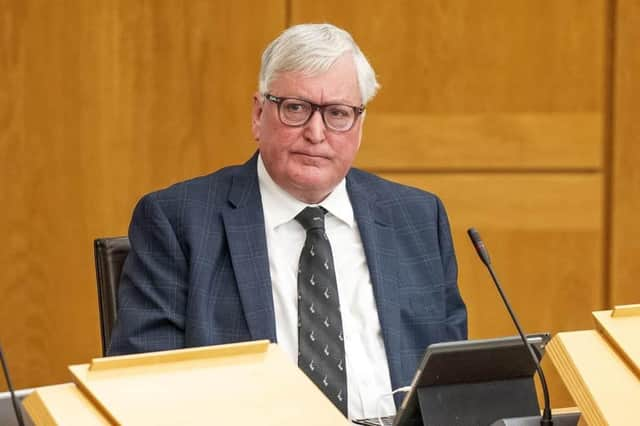New tax band would damage Scotland’s economy, warns SNP rebel Fergus Ewing


Introducing a new tax band for higher earners in Scotland would damage the economy and punish hard-working people, a former SNP minister has warned Humza Yousaf.
Fergus Ewing, an outspoken backbencher in Holyrood, said the rumoured proposals were “flawed” and the First Minister should instead “prune back on spending”.
Advertisement
Hide AdAdvertisement
Hide AdMr Yousaf is reportedly poised to introduce a new tax band as he battles to plug a £1.5 billion funding gap in next week’s Scottish Budget.
However, prominent SNP figures have warned against the idea. Kate Forbes, the former finance secretary, said Scotland already had “significantly increased” income tax rates and bands compared to England.
Michelle Thomson, the Falkirk East MSP, told The Scotsman it would “introduce more complexity into a system that is already quite complex”, adding: “And will it achieve what they are trying to do, which is to plug the budget shortfall? No, it won’t.”
The respected Fraser of Allander Institute (FAI) at Strathclyde University said introducing a new 44p tax rate for those earning between £75,000 and £125,140, which is thought to be along the lines of what Mr Yousaf is considering, would raise only around £41 million once behavioural changes are taken into account.
Possible behavioural responses include higher earners working fewer hours or receiving their pay in dividends. However, it could also include people choosing not to move to Scotland in the first place. Anyone earning more than around £28,000 already pays more in Scotland than they would south of the border.
The FAI said "significant spending cuts" are also likely to be required as the Scottish Government faces one of the most challenging financial backdrops to a Budget in the history of devolution.
"The new band will punish many hard-working people,” Mr Ewing, the MSP for Inverness and Nairn, told The Scotsman. “Some have already told me what’s the point of working harder when such a large share of earned income goes to the Government.
"In addition, I know that many very well paid people earning millions choose England as their tax domicile. If they have a London flat, as many may do, this is easy to do. For these reasons the tax proposals are flawed and will damage the economy.
Advertisement
Hide AdAdvertisement
Hide Ad"As Kate Forbes argues they may also not yield much revenue.
"The alternative approach is surely to prune back on spending in many ways – including much of the madcap, impractical, unaffordable green fantasies masquerading as policy. Quangos, commissioners, over-management in public services. These are all things that many constituents say to me should be subject to proper cost controls and scrutiny.”
Mr Ewing has been a long-term critic of the SNP’s power-sharing relationship with the Greens.
Shona Robison, the deputy first minister and finance secretary, previously warned of "very difficult" decisions as she prepares to publish the Budget on Tuesday. She said the Chancellor's recent Autumn Statement was the "worst-case scenario" for Scotland and left her little room for manoeuvre.
The FAI said the £1.5 billion funding gap is made up of roughly £800 million in resource (day-to-day) spending and £700 million in capital spending. The increase in resource spending is largely down to public sector pay awards, which are significantly higher than was budgeted for.
Comments
Want to join the conversation? Please or to comment on this article.
